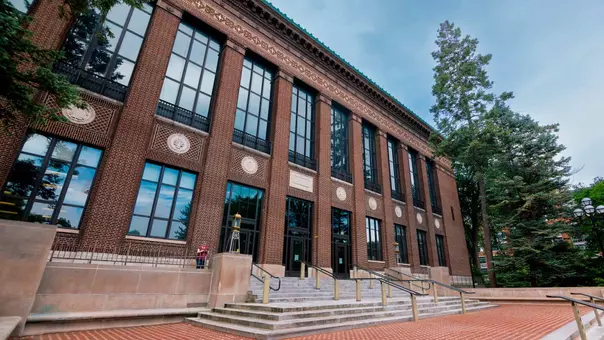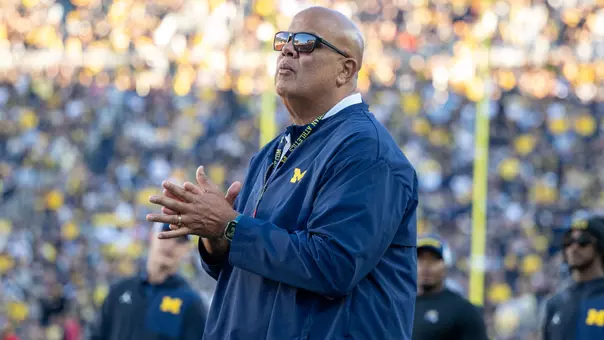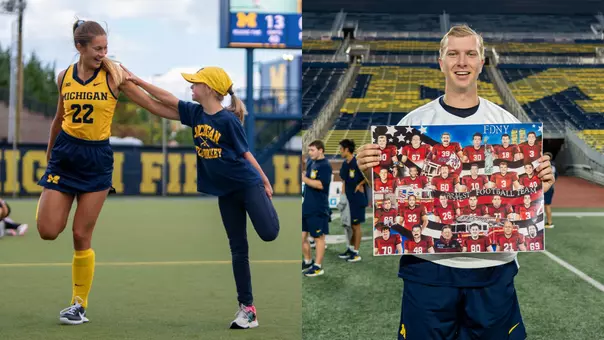Michigan Athletic Hall of Honor -- 1994 Induction Class
3/10/2004 12:00:00 AM | General
| Terry Barr Football (1954-56) In his playing days at Michigan, Barr played offense, defense, and handled the punting duties for the Wolverines. In 1955, Barr totaled 245 yards on 63 carries, a 3.9 yard per carry average. He also completed six passes for 119 yards and caught four passes for 74 yards. Following the 1955 season, he underwent a knee operation and was not able to participate in spring practice. As the 1956 season began, Barr returned to an unfamiliar right halfback position, and turned in the best collegiate season performance of his career. He played in all nine games that season, leading the Wolverines to a second-place finish in the Big Ten Conference, earning an All-Big Ten Conference selection, and a spot on the 1957 College All-Star grid squad. Barr was drafted by the Detroit Lions where he played from 1958 until 1965. During which, he was twice selected for the All-Star team. After his playing career, Barr began working in a manufacturer's representative firm, which he eventually purchased and currently owns. | ||
| Moby Benedict Baseball (1954-56) Detroit native, Moby Benedict, was raised on Wolverine sports and knew that when his time came he wanted to play for Michigan. Benedict began his U-M career as a shortstop for Ray Fisher, earning All-Big Ten Conference honors twice and captaining the team his senior season. Upon graduation in 1956, Benedict moved to professional baseball within the Detroit Tigers' organization, playing minor league ball in the Pioneer League, Eastern League and Sally League. In 1959, he left pro ball and was hired as an assistant under Michigan baseball coach Don Lund. When Lund left Michigan in 1963, Benedict took the head coaching reins, compiling a 345-238-5 record from 1963 to 1979. He led the Wolverines to Big Ten titles in 1975, 1976, and 1978, and appearances in NCAA Regional Tournament play for four straight years. The 1977 team won 33 games to set a school record (since broken), and the 1978 team placed fifth in the College World Series. A testament to his teaching of the game, 61 of his players made it to the pro ranks, 21 of those to the majors, including Ted Sizemore, Elliot Maddox, Leon Roberts and Geoff Zahn. In 1979 Benedict retired from coaching for U-M, becoming a minor league manager with the Tigers and the Expos. He later returned to U-M, and worked in the intramural sports program for 14 years. Benedict is now fully retired and living in Bear Lake, Mich. | ||
| Francie Goodridge Track (1966-68) Ann Arbor native Francie Kraker Goodridge aimed to make a name for herself. As a U-M undergraduate, there were no varsity athletics for females. Kenneth "Red" Simmons, along with his wife Lois, gave Goodridge a chance to compete when they developed a U-M women's track and field club team. The work paid off when Goodridge represented the United States in both the 1968 and 1972 Olympic Games, running the 800-meters in 1968 and the 1500m in 1972. She was a world and American record holder in the 600-yeard run and a U.S. national champion and record holder in the 800m. After her Olympic and college careers, Goodridge turned to coaching, beginning at the high school level and progressing to the collegiate ranks. Her Ann Arbor Huron team won a regional championship while the 1979 Greenhills team claimed the Michigan state individual and team titles. In between Goodridge tested college coaching as women's athletic director and cross country coach at University of Wisconsin-Milwaukee. She returned to Michigan in 1982 and led the Wolverine women's cross country team to the school's first NCAA District title and an eighth place finish at the NCAA National Championships. Two of Goodrich's runners Lisa Larsen and Melanie Weaver earned the cross country program's first ever NCAA All American citations. The U-M track and field team won the 1983 Big Ten Conference indoor title, and finished runner-up at both the 1982 and 1983 conference outdoor championships. Goodridge is presently head women's cross country and track and field coach at wake Forest University where she started the school's women's track program in 1984. Recognized as one of the country's best distance coaches, Goodridge was 1986 Atlantic Coast Conference Cross Country Coach of the Year and the 1993 ACC Track Coach of the Year. | ||
| Rickey Green Basketball (1976-77) One of the best known players in Michigan basketball history, Rickey Green made his mark as a defensive terror and natural point-scorer. As a junior, his first year at Michigan, Green led the team in scoring (19.9 ppg), helped the Wolverines advance to the 1976 NCAA Championship game, garnered Honorable Mention All-America honors and was named the team's Most Valuable Player. In his senior year, Green averaged 19.6 points per game and led Michigan to the Big Ten Championship and the NCAA Sweet Sixteen. His total of 1,184 points is the second-most scored by a Michigan player in a two year span. Green was selected to the NCAA All-Tournament team and was an All-Big Ten Conference selection each year. Also earning, consensus First-Team All-American honors and runner-up for the nation's collegiate player of the year award in 1977. After completing his Michigan career, Green was selected in the first round of the NBA Draft by the Golden State Warriors. Green spent time Golden State, Detroit, Utah, Charlotte, Indiana, Philadelphia, and Boston, during his 14-year professional career. During his pro tenure, Green was recognized for being an extremely durable player, breaking the Utah Jazz franchise record for most games played (606) in 1987. Also during his time with the Jazz, Green made NBA history by scoring the league's give-millionth point. While playing in the professional ranks, Green continued his Michigan academic career, earning his degree in 1981. | ||
| Frank Legacki Swimming (1958-61) A native of Philadelphia, Legacki arrived at Michigan in the fall of 1957 to study and swim under legendary coach Gus Stager. The coach developed Legacki into a national champion. Legacki won the 1959 NCAA titles in the 100-meter freestyle and the 400-meter freestyle relay, and the 1961 NCAA championship in the 50-meter freestyle. He also swam to Big Ten titles in the 100-meter freestyle (1959, 1960) and the 50-meter freestyle (1960). Legacki, captain of the 1961 Michigan squad, got Michigan's 1961 NCAA Championship swim started with an upset victory in the first event, the 50-meter freestyle. He was clocked at: 21.4, an American record. A national AAU 100 butterfly champion, Legacki was the first swimmer to go under 52 seconds in short course, and a member of the U.S. National team that toured Japan in 1959. In addition to his athletic activities, Legacki served as president of Sigma Chi Fraternity and was Master of Ceremonies at four all-campus shows and pep rallies. Now in San Antonio, Texas, Legacki, a U-M Business school graduate is President of Kaepa Inc., an athletic shoe company which was once the shoe sponsor for both the Michigan cheerleading and volleyball teams. | ||
| John MacInnes Hockey (1945-50) John MacInnes played for the Michigan ice hockey team as a goalie in the 1945-1950 seasons. However, it is what MacInnes did with that hockey knowledge which distinguishes him most. MacInnes is widely recognized as one of the greatest coaches in collegiate hockey history. He spent 26 seasons at Michigan Tech, guiding the Huskies to 555 wins and 295 losses, the record for most career wins in collegiate hockey history, three national titles (1962, 1965, and 1975), and seven Western Collegiate Hockey Association championships. He was named WCHA Coach of the Year six times and was NCAA Coach of the year in both 1970 and 1976. During his tenure, 21 of Michigan Tech players received All-America honors and his teams posted an impressive 94 percent graduation rate. MacInnes' success is attributed to his calm demeanor and even temperament on and off the ice. Outside of the Michigan Tech rink, MacInnes may be most famous for his role in the founding of the Great Lakes Invitational hockey tournament. Since the GLI's inception in 1965, more than 700 college hockey players have been drafted by the National Hockey League, a number which coincides with the event's ever-increasing exposure. MacInnes' impact on the GLI is evident, as the tournament's Most Valuable Player and championship team awards both bear his name. MacInnes passed away March 6th, 1983. He was elected posthumously as a charter member of the Michigan Tech Sports Hall of Fame in 1984. He was also honored with the NHL's Lester Patrick Award for outstanding service to hockey in the United States Jan. 7, 1986. | ||
| Tom Maentz Football (1954-56) From captaining the 1956 Wolverine football team to founding his own business, Maentz is not afraid to take the initiative. Playing tight end at 6-3, 210 pounds, Maentz regular lined-up against opponents who were 30 to 40 pounds heavier. Maentz relied on his speed, agility and quickness to compensate for his lack of size. In his junior year, Maentz led the Wolverines in reception yardage totaling 253 yards in nine games. As a senior, Maentz played with All-American tight end Ron Kramer, forming one of the finest set of ends in Michigan football history. Not only did Maentz catch the ball, but he also handled the punting duties, averaging 40.1 yards per punt his last year. Maentz's playing career culminated with a 19-0 victory over Ohio State in Columbus, one of his fondest memories of Michigan. Even after his Michigan football career, Maentz still takes very seriously the commitment he made to Michigan in the spring of 1953, remaining involved in Michigan Athletics as a contributor to various departmental projects and serving on athletic leadership committees. Professionally, he runs TSM Corporation, a company that manufactures steel castings, and also heads Tom S. Maentz Inc., a sales corporation which represents different automotive parts companies. | ||
| Jim Mandich Football (1967-69) The All-American tight end, Jim Mandich, was the 1969 Wolverine football captain and Most Valuable Player in Bo Schembechler's first season. During the 1969 season, Mandich caught 50 passes for 676 yards, seven games with 75 or more receiving yards, led the team to the 1969 Big Ten Championship and a trip to the Rose Bowl, in which he had eight catches for 79 yards. Following his senior year, he was named a consensus All-American, and Academic All-American and received the Michigan Amateur Athlete of the Year Award. Mandich finished his career at U-M with 119 catches for 1494 yards and seven touchdowns. After graduating from Michigan, Mandich was the first pick of the Miami Dolphins in the 1970 National Football League Draft. Playing for Coach Don Shula, Madich was a key contributor on the field as well as serving as the Dolphins' player labor representative from 1974-1977. One of his fondest pro football memories is being part of the 1972 Dolphin team which posted professional football's only perfect season record. He played on three Super Bowl Championship teams, two with Miami (1972, 1973), and one with the Pittsburgh Steelers (1978). Mandich now resides in Miami Lakes, Fla., where he heads a successful contracting company, as well as hosts a sports talk radio show. He continues his involvement in football, serving as a color commentator for the SportsChannel cable network and other local television broadcasts of collegiate games. Mandich is deeply involved in community service in the greater Miami area, and is particularly proud of his association with the Miami Project to Cure Paralysis and the Dorothy Shula Foundation. | ||
| Dominic Tomasi Football, Baseball (1945-48) While at Michigan, Dominic Tomasi played for coaching greats Fritz Crisler and Bennie Oosterbaan. The offensive guard was a driving force behind the 1947 and 1948 Big Ten and National Championship teams that were both undefeated. Not only was Tomasi elected captain after the 1948 Rose Bowl game, but he was also unanimously voted Most Valuable Player in 1948. Tomasi's athletic talents extended to the Wolverine baseball diamond as he earned four letters in baseball playing in the infield under legendary coach Ray Fisher. Tomasi graduated from Michigan with a degree in mechanical engineering and joined the Buick Division of General Motors. After a two year tour for the Army during the Korean War, he returned to Buick and ultimately took on the role of master mechanic of the Buick Foundry in Flint. In 1984 he was elected to the Greater Flint Area Sports Hall of Fame for his achievements in athletics as well as his involvement within the community. Tomasi maintained his interest in Michigan athletics and supported many activities and functions of the Athletic Department until his death. |
2025 Michigan Athletics Hall of Honor Class On-Field Recognition
Saturday, October 18
Michigan Athletics Presents The Maizies 2025
Thursday, April 24
Our Voices: Black History Month Conversations | Episode 6
Wednesday, February 26
Our Voices: Black History Month Conversations | Episode 5
Friday, February 21










